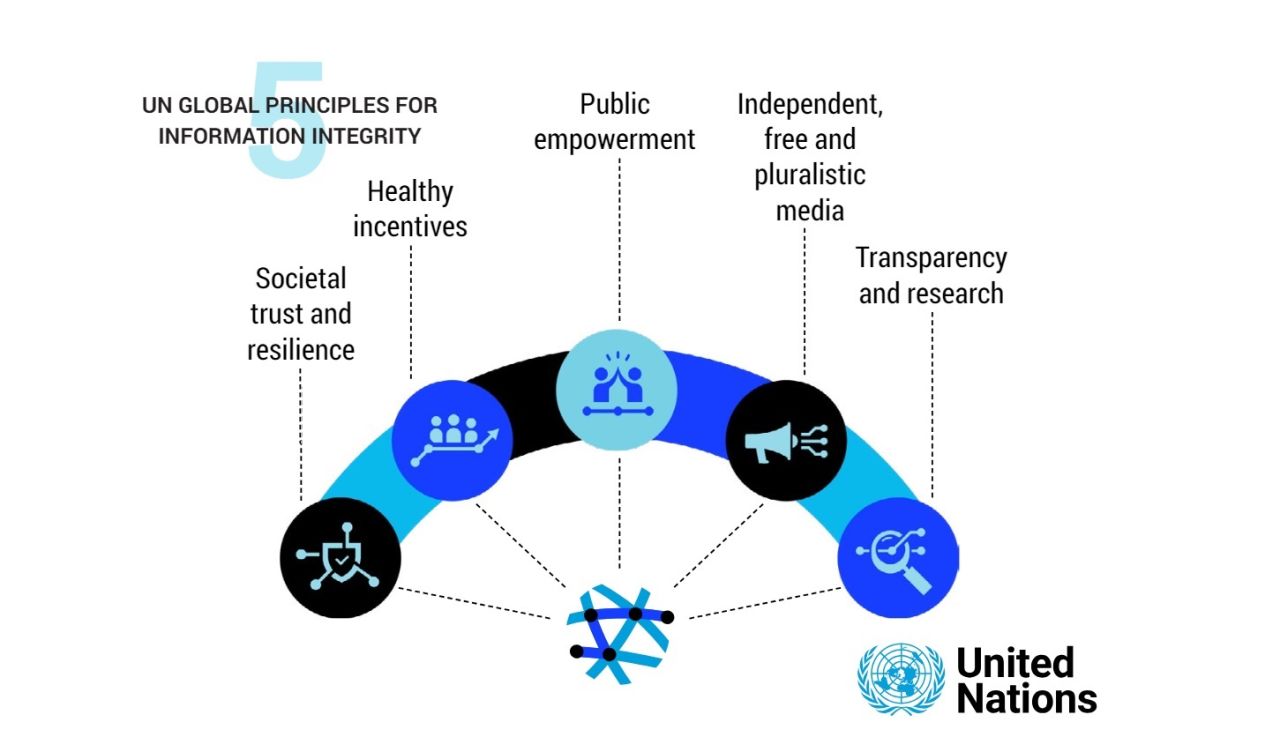Context
-
The United Nations Secretary-General Antonio Guterres unveiled the Global Principles for Information Integrity, a comprehensive framework aimed at addressing the escalating threats posed by misinformation, disinformation, and hate speech in the digital realm.

About Global Principles for Information Integrity
- The Global Principles for Information Integrity were developed through extensive consultations with Member States, the private sector, youth leaders, media, academia, and civil society.
- The principles aim to create healthier and safer information environments that uphold human rights and promote peaceful societies and a sustainable future. Key recommendations include:
-
- Combating disinformation and hate speech: All stakeholders, including governments, tech companies, advertisers, and media, should avoid using, supporting, or amplifying disinformation and hate speech for any purpose.
-
- Promoting media freedom: Governments should ensure timely access to information, maintain a free, viable, independent, and plural media landscape, and provide strong protections for journalists, researchers, and civil society.
-
- Enhancing tech company responsibilities: Technology companies should incorporate safety and privacy by design in all products, apply policies consistently across countries and languages, and give particular attention to groups often targeted online. Additionally, they should prioritise crisis response and support information integrity during elections.
-
- Ethical AI development: AI developers must take immediate, inclusive, and transparent measures to ensure AI applications are designed, deployed, and used ethically and safely, upholding human rights.
-
- Reforming business models: Tech companies should explore business models that do not rely on programmatic advertising and prioritise human rights, privacy, and safety. Users should have greater control over their online experiences and personal data.
-
- Transparency in advertising: Advertisers should demand transparency in digital advertising processes to ensure their budgets do not inadvertently fund disinformation or hate and do not undermine human rights.
-
- Data transparency and accountability: Tech companies and AI developers should ensure meaningful transparency, allow researchers and academics access to data while respecting user privacy, commission independent audits, and co-develop accountability frameworks.
-
- Protecting children: Special measures should be taken to protect and empower children, with governments providing resources for parents, guardians, and educators.
Significance of Global Principles for Information Integrity
- These principles will serve as a vital resource for Member States ahead of the upcoming Summit of the Future in September, where further discussions on global cooperation are expected to take place.
- The launch of the Global Principles for Information Integrity marks a critical step towards addressing the complex challenges posed by the digital information landscape, advocating for a united and principled approach to safeguarding human rights and maintaining the integrity of information worldwide.
Source: DTE
Visit Abhiyan PEDIA (One of the Most Followed / Recommended) for UPSC Revisions: Click Here
IAS Abhiyan is now on Telegram: Click on the Below link to Join our Channels to stay Updated
IAS Abhiyan Official: Click Here to Join
For UPSC Mains Value Edition (Facts, Quotes, Best Practices, Case Studies): Click Here to Join
